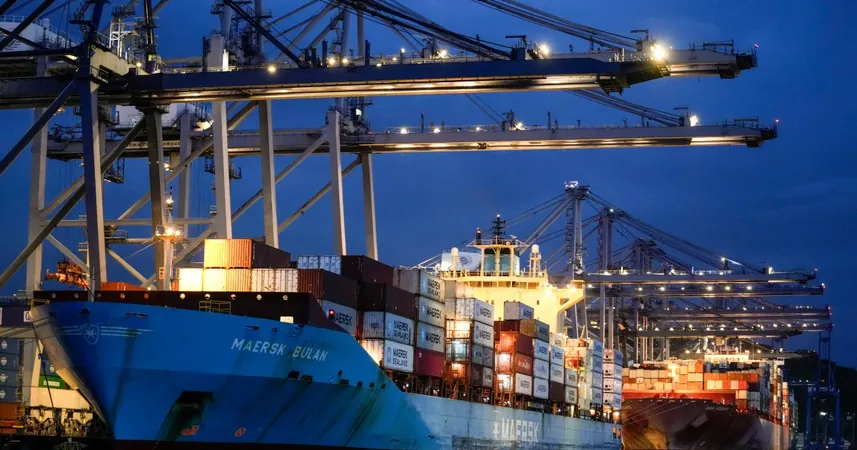
Why Is China Fuming Over a Potential Sale of Two Ports on the Panama Canal?
2025-04-01
Author: Ying
Introduction
In a stunning megadeal announced earlier this month, CK Hutchison, one of Hong Kong's largest conglomerates, revealed plans to divest its stake in two strategic ports on the Panama Canal to a group of US investors led by industry giant BlackRock. This $22.8 billion transaction aims to give the consortium control over over 40 ports across 23 countries—a move that has not gone unnoticed by China.
The timing of this deal coincides with heightened tensions as US President Donald Trump previously expressed alarm over perceived Chinese dominance in this crucial shipping lane. The proposed sale triggered immediate backlash from Beijing, showcasing the fragile relationship between China, Hong Kong, and the United States.
In just under two weeks following the announcement, CK Hutchison’s stock enjoyed a brief surge before plunging amidst scathing op-eds from Ta Kung Pao, a state-run newspaper in Hong Kong. The articles lambasted the conglomerate’s decision as one of “spineless grovelling” that allegedly betrayed the Chinese populace. As the April 2 deadline for signing the deal approaches, CK Hutchison finds itself at the epicenter of political crossfire from both Washington and Beijing.
Why Is China Opposing the Deal?
Chinese media, particularly Ta Kung Pao, often serves as a mouthpiece for the government’s stance, implying that the Communist Party is not pleased with CK Hutchison's lack of consultation over the sale. Sources indicated that President Xi Jinping himself was troubled by the lack of communication regarding the ports, which he hoped to use as leverage in dealings with Trump. These ports, pivotal for Chinese trade, are essential in the context of ongoing geopolitical rivalry between the US and China.
China’s market regulator has announced an antitrust investigation aimed at maintaining fair competition, further complicating CK Hutchison's position. Local reports speculate that this investigation could deter the company from pushing forward with the sale.
CK Hutchison’s Complicated Legacy with Beijing
The proposed sale has ignited existing tensions between CK Hutchison and the Chinese government. The company’s founder, Li Ka-shing, has a storied history in post-colonial Hong Kong, building a vast fortune while adeptly navigating both Western capital markets and the Communist regime’s mandates. His past close ties with early Chinese leaders have waned under Xi Jinping, leading to Li's gradual distancing from mainland investments.
Li's decision to register certain business interests in the Cayman Islands and diversify away from China has fueled speculation about his current political standing. Some observers argue that the Li family’s more measured stance on Hong Kong's pro-democracy movement contrasts sharply with other local tycoons who have openly aligned with Beijing.
Can Beijing Halt the Sale?
Despite Beijing's evident discontent, experts believe they might have limited legal avenues to entirely prevent the sale, as the ports are outside Chinese jurisdiction. However, any potential acquisition could still be obstructed if the government asserts that BlackRock's control could create monopolistic conditions affecting regional trade routes.
As an alternative to legal avenues, experts anticipate that Beijing may leverage economic pressure points, particularly through CK Hutchison’s remaining business interests within mainland China. With a significant portion of their revenue still linked to Chinese markets, the company could be vulnerable to the ramifications of political backlash.
The Ominous Shadow of Government Retaliation
Analysts are keenly aware of the underlying potential for Beijing to make an example of CK Hutchison, reminiscent of how Alibaba founder Jack Ma faced severe repercussions following his critical comments of Chinese regulatory practices. The atmosphere has shifted dramatically since then, as prominent figures from within China’s business elite have faced risks ranging from public disappearances to swift regulatory actions.
What Lies Ahead for CK Hutchison?
The clock is ticking with just a day left until the April 2 deadline. While developments from Chinese regulators signal a cautious environment, the Hong Kong government currently shows no inclination to interfere. Nevertheless, reports indicate that some businesses have been advised to limit collaboration with CK Hutchison, which could create a fraught landscape for future operations.
Interestingly, in the midst of this turmoil, Li’s son Richard was invited to a prominent business summit in Beijing, signaling that there is room for favorable dialogue even amid the complications of the deal. As the negotiations remain veiled in secrecy, observers speculate how CK Hutchison will maneuver this precarious situation. The looming ambiguity offers a tantalizing glimpse into the intersection of international business, regional control, and geopolitical strategies.
As both global economic players and the world's media watch intently, the fate of this high-stakes deal remains uncertain—could this be a pivotal moment that reshapes the future of international trade on one of its most vital waterways?




 Brasil (PT)
Brasil (PT)
 Canada (EN)
Canada (EN)
 Chile (ES)
Chile (ES)
 Česko (CS)
Česko (CS)
 대한민국 (KO)
대한민국 (KO)
 España (ES)
España (ES)
 France (FR)
France (FR)
 Hong Kong (EN)
Hong Kong (EN)
 Italia (IT)
Italia (IT)
 日本 (JA)
日本 (JA)
 Magyarország (HU)
Magyarország (HU)
 Norge (NO)
Norge (NO)
 Polska (PL)
Polska (PL)
 Schweiz (DE)
Schweiz (DE)
 Singapore (EN)
Singapore (EN)
 Sverige (SV)
Sverige (SV)
 Suomi (FI)
Suomi (FI)
 Türkiye (TR)
Türkiye (TR)
 الإمارات العربية المتحدة (AR)
الإمارات العربية المتحدة (AR)